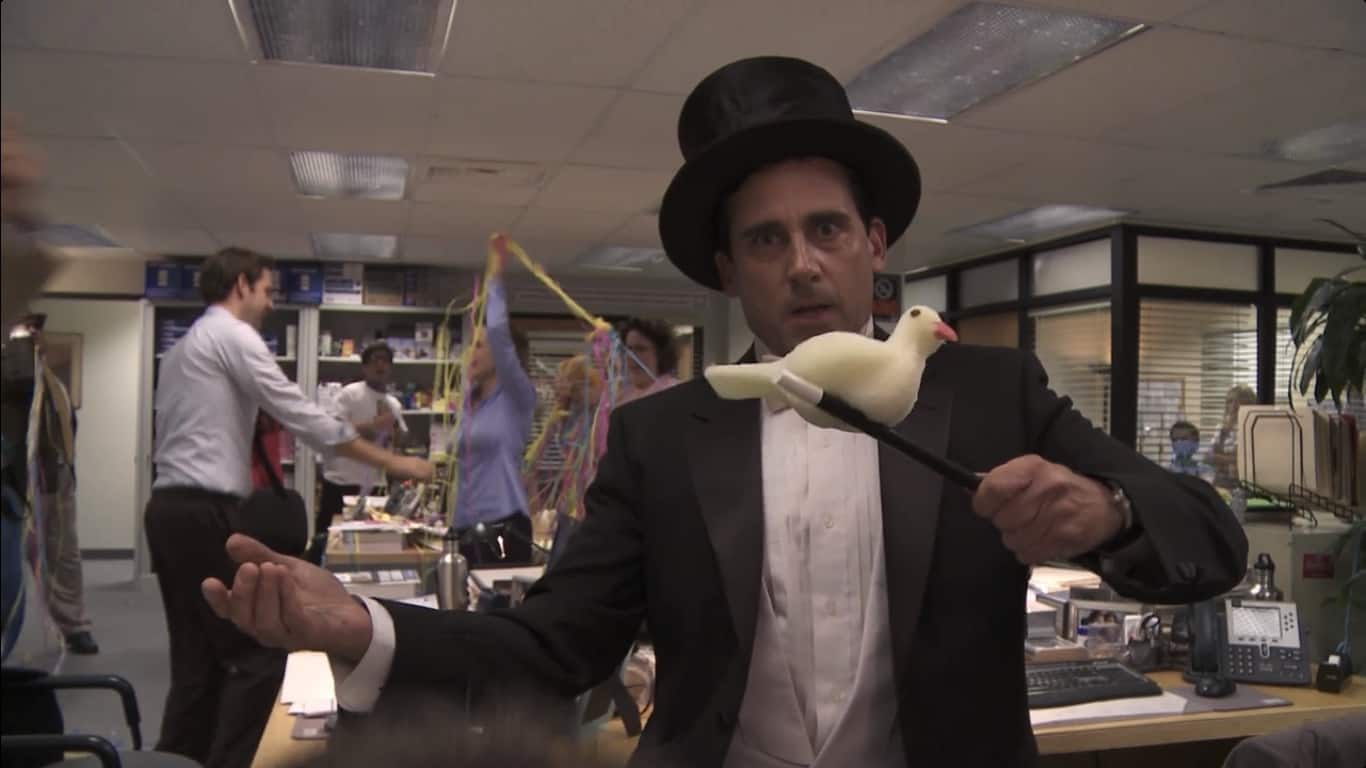The Office: possibly the most beloved and successful comedy mockumentary of the American office-style work environment to have graced the world almost 20 years ago. The everyday lives of employees are tested throughout nine seasons at Dunder Mifflin, a fictional paper company, run by incompetent branch manager Michael Scott. Almost immediately, it becomes apparent that Michael is a shining example of how not to manage an office, despite how comical he can be.
In the spirit of good comedy, The Office imitates life, and Michael Scott’s management style isn’t so far from real life. Michael is disinterested in political correctness and flaunts his rejection of any management technique not found in his never-to-be-published book, “Somehow I Manage.” With one sentence, he can offend and disgust the entire office. Basically, Michael Scott’s character is an exaggeration of the corporate stereotype of the conceited jerk boss (although we later learn Michael has a good heart).
From this premise, hilarity ensues every episode as we watch Michael Scott exhaust and confound his weary employees with his endless shenanigans. His most famous managerial technique must not be ignored: his invention of alter egos based on the situation at hand to help teach his subordinates a “valuable” lesson.
Here are a few lessons your business management team can learn from Michael’s top three alter egos:
Management Lesson 1: Prison Mike
Prison Mike is a character Michael creates to help his employees understand a very important point: that prison is, in fact, worse than Dunder Mifflin. He wants his employees to remember they should be thrilled by their cushy jobs.
Prison Mike emerges when Michael gets frustrated when Martin, an employee who has been to prison before, describes his time in prison before he worked for Dunder Mifflin. The receptionist Pam teasingly suggests prison sounds better than working in the office because the prisoners got outside time and took art classes. Michael forces everyone in the office to go outside in the bitter cold for “outside time,” and he later dons a purple bandanna and creates Prison Mike. Michael cannot comprehend why anyone wouldn’t love working at Dunder Mifflin, especially under his management, and therefore becomes furious when the office is compared to prison. The drama ends with Toby of human resources reminding Michael that the staff is simply teasing him, and it’s just playful employee banter.
What can we learn from Michael’s (humorous) lack of a sense of humor? Only insecure managers would see employee banter of this nature as a threat to the culture of the office or as a criticism of their management skills. Confident managers recognize the difference between playful criticism and truly unhappy employees and would take the time to check in to ensure their team members are doing well.
Management Lesson 2: Michael the Magic
Not only does Michael the Magic have a penchant for magic, he believes he can keep his employees entertained and engaged by performing magic tricks and reminding them of the “magic of sales.” He even sets up a prop briefcase full of magic tricks and performs for other Dunder Mifflin branches.
Since Michael is terrible at reading people, he never notices how deeply his employees loathe his magic tricks. Despite how much time, money, and energy he puts into magic for the sake of connecting with his team, it falls on deaf ears. Every attempt is a waste of time in the eyes of the employees—something Michael does not see and will never accept.
But Michael is right about one thing: finding ways to inspire and motivate your team is essential, but it’s important to set and follow a clearly defined meeting agenda. Remember to take time to notice and celebrate your employees when they deserve to be recognized. On a smaller level, bringing in snacks or coffee or choosing a different venue can help create more engaging and effective meetings.
Management Lesson 3: Michael Klump
Michael Klump arrived just in time to rescue office morale, which may or may not have needed saving, by fostering a positive body image environment. Michael Klump knows that confident employees are productive employees.
In his partially-inflated sumo suit underneath his business suit, Michael Klump was once an alter ego that made fun of obese people. When he reappears, however,, Michael Klump exists for the sole purpose of “celebrating body image.” He just wants to show that overweight people are people too. In the episode, Dunder Mifflin’s employees participate in a company-wide weight loss competition to see which branch can lose the most weight collectively for a prize, which is taken too seriously by some of the branch employees. Michael makes it his mission to ensure all the employees know they are beautiful just the way they are. Although his intentions were good, his attempt to boost morale by encouraging a healthy lifestyle and body positivity were thwarted by the insulting appearance of his Michael Klump character.
Where did Michael go wrong? One of the most important aspects of being a boss and maintaining office morale is building a bond of trust within your employees. When your team respects each others time and opinions, and feelings are honored, it creates a united team. But that respect and that bond of trust has to start with you, and that means you’ll need more than Michael Scott-like good intentions. You’ll need the kind of self-awareness (including an awareness of your own prejudices) without which you cannot improve office morale or positively transform your office culture.
While we don’t recommend introducing your own versions of Michael’s alter egos in an effort to improve the quality of your workplace, knowing what not to do can put your own actions into the right perspective. Consider which of the Michael Scott alter egos might reflect real actions and behaviors in your office, readjust your attitudes and behaviors as needed, and make sure to show your employees the respect necessary to truly maintain good office morale.
Looking for more management advice? Check out Northwest’s “3 Lessons in Management From the Words of Tony Soprano” for more.


